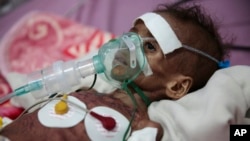The devastation wrought by Russia’s invasion of Ukraine has commanded newspaper front pages and nightly news broadcasts since the war began in February. But the effects of the conflict extend far beyond the borders of Ukraine and already are being felt in Yemen, the country mired in what experts see as one of the most dire humanitarian crises in the world.
On Friday, Yasmin Faruki, a senior policy adviser with the humanitarian aid group Mercy Corps, spoke with VOA about her recent trip to Yemen, the suffering she witnessed there, and the expectation that fallout from the crisis in Ukraine will further immiserate the millions of Yemeni people facing major shortages of food and fuel.
“Overall, it's a very dark picture,” Faruki told VOA. “I saw people, most families, living off of one meal a day, in an extremely unstable security environment, with skyrocketing prices.”
Now, as the lack of wheat shipments from Ukraine’s Black Sea ports begins to be felt in the global supply chain, the results for Yemen are easy to predict.
“The bottom line," Faruki said, "is that this is going to make matters a lot worse for Yemeni families who are already struggling with so little.”
She said that in larger cities — she was primarily in the port city of Aden and in Taiz — commerce has slowed to a crawl, leaving many people unable to earn money to buy food. Outside cities, Faruki described scenes of desperation, with families sharing reduced food rations that leave young children unable to develop normally.
Origins of the conflict
“It's important for the international community to note that Yemen is not in the first year of a humanitarian crisis,” Faruki said. “There are a number of crises unfolding around the world that undoubtedly deserve our attention, but Yemen is being treated like it's in the first year of an emergent crisis, and it's going into its eighth.”
The conflict in Yemen began in 2014, when rebels aligned with the Houthi movement seized the capital city, Sanaa, forcing the government of President Abed Rabbo Mansour Hadi to establish a temporary new capital in Aden. In the years since, a coalition of Arab nations led by Saudi Arabia has waged war on the Houthis, who are backed by the government of Iran.
According to the United Nations Children’s Fund (UNICEF), the war in Yemen has left 23.7 million people in need of humanitarian assistance, the overwhelming majority of whom need food aid. Millions of Yemenis have been internally displaced by the ongoing violence, making that aid difficult to deliver.
On March 14, three weeks after the beginning of Russia’s invasion of Ukraine, UNICEF reported that “Yemen’s already dire hunger crisis is teetering on the edge of outright catastrophe.”
‘World’s worst humanitarian crisis’
According to the Integrated Food Security Phase Classification, a measurement compiled by the United Nations and more than a dozen other non-governmental organizations, the situation is expected to deteriorate over the coming months.
The latest analysis predicts that in Yemen, “approximately 2.2 million children under the age of 5, including 538,000 severely malnourished, and about 1.3 million pregnant and lactating women are projected to suffer from acute malnutrition over the course of 2022.”
“Yemen has been the world's worst humanitarian crisis for years now,” Jordan Teague, interim director for policy analysis and coalition building for the charity group Bread for the World, told VOA.
“Already 80% of its people depend on aid just for their basic needs, just to survive. And the impacts of the war [in Ukraine] are already being felt there,” Teague said. “It's something that's happening now. Yemen is really dependent on imports for so much, not least, food and fuel. And Ukraine actually produces almost a third of Yemeni wheat supplies.”
Teague noted that the U.N.’s World Food Program has been forced to reduce the rations of food it provides to the people of Yemen, primarily because of price increases that leave the agency struggling to afford needed supplies.
Even before the war in Ukraine, prices were soaring, with the average price of a basket of food provided by the WFP increasing 170% in 2021. In the month since the war started, wheat prices in Yemen have jumped by an additional 30%.
Children dying
Faruki described a visit to a mountaintop village, two hours’ drive from Taiz, where families are struggling to feed themselves as food becomes increasingly difficult to obtain.
“I asked one of our health workers, what was the leading cause of death, and he said it’s acute diarrhea,” she said. Many of the victims are small children, Faruki added, 2-, 3-, and 4-year-olds suffering from acute malnutrition.
The children have been so hungry for so long that their bodies have lost the ability to retain food, even when they have it.
“You're seeing these kinds of cascading, really negative effects of what not having enough food and nutrients means for generations of Yemenis and their ability to exist and to survive on a day-to-day basis,” she said.




